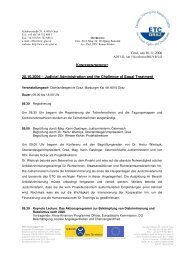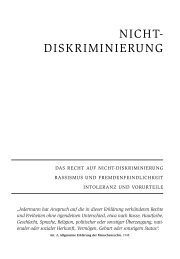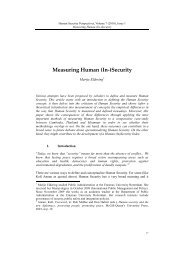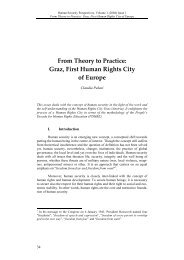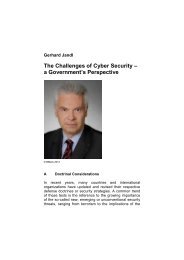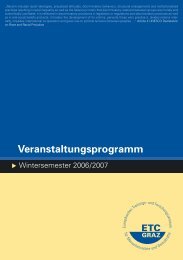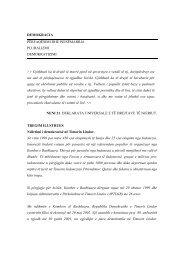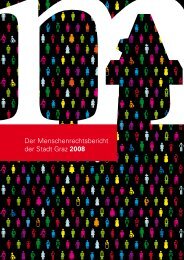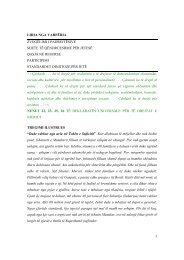Civil-military Coordination in the Common Security and ... - ETC Graz
Civil-military Coordination in the Common Security and ... - ETC Graz
Civil-military Coordination in the Common Security and ... - ETC Graz
Create successful ePaper yourself
Turn your PDF publications into a flip-book with our unique Google optimized e-Paper software.
<strong>Civil</strong>-<strong>military</strong> <strong>Coord<strong>in</strong>ation</strong> <strong>in</strong> <strong>the</strong> <strong>Common</strong> <strong>Security</strong> <strong>and</strong> Defence Policy of <strong>the</strong> European Union<br />
A Introduction<br />
In <strong>the</strong> European <strong>Security</strong> Strategy 1 (ESS) <strong>and</strong> its Implementation Report, 2 <strong>the</strong><br />
member states (MS) of <strong>the</strong> European Union (EU) have publicly agreed that today’s<br />
security threats are not purely <strong>military</strong>. They also consented that today’s threats<br />
cannot be tackled by purely <strong>military</strong> means. 3 Ra<strong>the</strong>r, each response to a crisis or<br />
conflict, <strong>the</strong>y argue, requires a mixture of <strong>in</strong>struments. Experience has <strong>in</strong>deed shown<br />
that <strong>the</strong> traditional sequence of <strong>military</strong> <strong>in</strong>tervention followed by a civilian presence<br />
for reconstruction is not applicable anymore <strong>and</strong> that <strong>in</strong>tegrated concepts, which<br />
utilize all tools available already from <strong>the</strong> beg<strong>in</strong>n<strong>in</strong>g are needed. 4 Such <strong>in</strong>tegrated<br />
approaches are <strong>in</strong> l<strong>in</strong>e with contemporary security concepts, like human security,<br />
which draw attention to <strong>the</strong> broadened scope of security threats <strong>and</strong> emphasize <strong>the</strong><br />
need for more comprehensive approaches to tackle <strong>the</strong>se threats. 5<br />
The EU is often considered to be <strong>in</strong> a particularly good position to offer <strong>the</strong> right<br />
mix of <strong>in</strong>struments required for comprehensive crisis management. Javier Solana<br />
even believes that <strong>the</strong> comprehensive approach underp<strong>in</strong>n<strong>in</strong>g <strong>the</strong> <strong>Common</strong> <strong>Security</strong><br />
<strong>and</strong> Defence Policy (CSDP) is its value added. 6 Yet, what progress has <strong>the</strong> EU made<br />
thus far to coord<strong>in</strong>ate its civilian <strong>and</strong> <strong>military</strong> tools for crisis management? <strong>Civil</strong><strong>military</strong><br />
<strong>Coord<strong>in</strong>ation</strong> (CMCO) is usually regarded as a dem<strong>and</strong><strong>in</strong>g undertak<strong>in</strong>g that<br />
entails numerous steps <strong>and</strong> contentious issues. A successful implementation of<br />
CMCO would, for <strong>in</strong>stance, require a jo<strong>in</strong>t plann<strong>in</strong>g, a common doctr<strong>in</strong>e <strong>and</strong> jo<strong>in</strong>t<br />
tra<strong>in</strong><strong>in</strong>g, jo<strong>in</strong>t early warn<strong>in</strong>g, jo<strong>in</strong>t situation assessment <strong>and</strong> fact-f<strong>in</strong>d<strong>in</strong>g, coord<strong>in</strong>ated<br />
* Mag. iur. Markus Möstl is research fellow <strong>and</strong> doctoral student at <strong>the</strong> Institute of<br />
International Law <strong>and</strong> International Relations of <strong>the</strong> University of <strong>Graz</strong>, Austria. You may<br />
contact <strong>the</strong> author at: markus.moestl@uni-graz.at. The author would like to thank Sven<br />
Biscop for his valuable comments on an earlier draft of this paper which was presented at<br />
<strong>the</strong> 4th <strong>Graz</strong> Workshop on <strong>the</strong> Future of <strong>Security</strong>.<br />
1 Council of <strong>the</strong> European Union, A secure Europe <strong>in</strong> a better world – <strong>the</strong> European<br />
<strong>Security</strong> Strategy, approved by <strong>the</strong> European Council held <strong>in</strong> Brussels on 12 December<br />
2003 <strong>and</strong> drafted under <strong>the</strong> responsibilities of <strong>the</strong> EU High Representative Javier Solana.<br />
2 Council of <strong>the</strong> European Union, Report on <strong>the</strong> implementation of <strong>the</strong> European <strong>Security</strong><br />
Strategy – Provid<strong>in</strong>g security <strong>in</strong> a chang<strong>in</strong>g world, approved by <strong>the</strong> European Council<br />
held <strong>in</strong> Brussels on 11 <strong>and</strong> 12 December 2008 <strong>and</strong> drafted under <strong>the</strong> responsibilities of<br />
<strong>the</strong> EU High Representative Javier Solana.<br />
3 The threats were identified as <strong>the</strong> proliferation of weapons of mass destruction, regional<br />
conflicts, state failure, but also <strong>in</strong>clude terrorism, organized crime, <strong>and</strong> <strong>the</strong> effects of<br />
climate change.<br />
4 Margriet Drent/Dick Z<strong>and</strong>ee, Break<strong>in</strong>g pillars. Towards a civil-<strong>military</strong> security approach<br />
for <strong>the</strong> European Union, Ne<strong>the</strong>rl<strong>and</strong>s Institute of International Relations ‘Cl<strong>in</strong>gendael’,<br />
2010, 2.<br />
5 See, e.g., Commission on Human <strong>Security</strong>, Human <strong>Security</strong> Now, New York, 2003, 133;<br />
or Human <strong>Security</strong> Unit, Human <strong>Security</strong> <strong>in</strong> <strong>the</strong>ory <strong>and</strong> practice, Application of <strong>the</strong> Human<br />
<strong>Security</strong> Concept <strong>and</strong> <strong>the</strong> United Nations Trust Fund for Human <strong>Security</strong>, United Nations,<br />
Office for <strong>the</strong> <strong>Coord<strong>in</strong>ation</strong> of Humanitarian Affairs, 6.<br />
6 Javier Solana, Remarks at <strong>the</strong> conference ESDP@10: What lessons for <strong>the</strong> future,<br />
EUISS, Brussels, 28 July 2009.<br />
31





